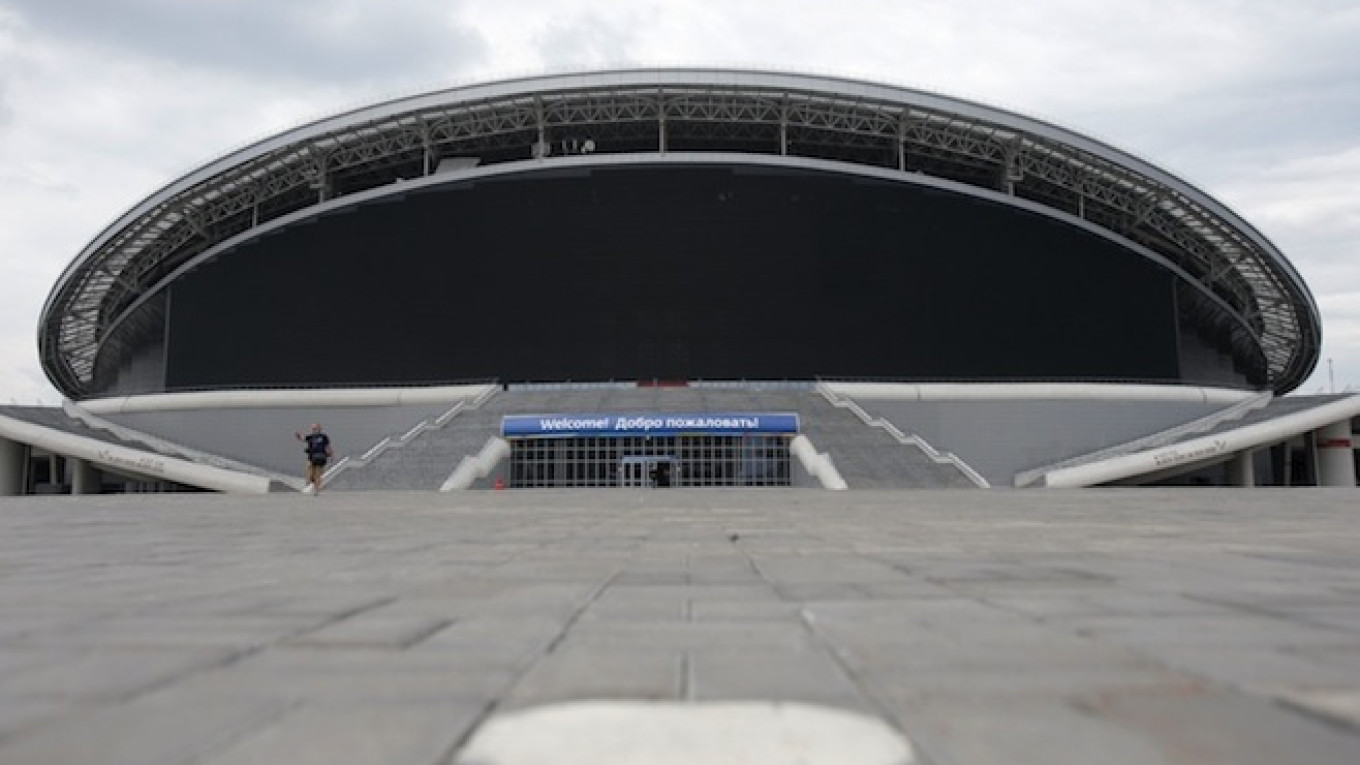In a country battered by economic problems and Western sanctions, Russian officials aren't boasting of their World Cup's size and extravagance. With cost-cutting in vogue, they prefer to brag about cheap stadiums.
At an estimated cost of 350 million euros ($390 million), refurbishing Moscow's hulking Soviet-era Luzhniki stadium into an 81,000-seat venue to host the 2018 World Cup final is a bargain in global terms, says Deputy Mayor Marat Khusnullin.
"On the current euro exchange rate, it will be one of the cheapest of all the stadiums which have been built or reconstructed in the last 10 years, that were prepared for this level of competition," Khusnullin said this week.
Cost-cutting isn't coming at the cost of ambition, Khusnullin insisted as he led a tour of the construction site.
"We're setting a very high-quality level of construction," Khusnullin said. "The entire roof of the stadium will be one whole media screen."
Pictures displayed on Luzhniki's vast oval roof will certainly make a statement to any television broadcast helicopters during the final three years from now, while Muscovites will be able to watch the show from nearby hills or a highway flyover, Khusnullin says.
Luzhniki's facade dates from the 1950s and is being preserved — almost the only part to survive intact from the venue which hosted Manchester United's win over Chelsea in the 2008 Champions League final. For that match, a wide athletics track separated fans from the action, but by 2018, Luzhniki will be a football-only venue.
"We're maybe not very complimentary to kinds of other sports, but for football fans of course it's a very comfortable solution," the Moscow city government's chief architect Sergei Kuznetsov says. "Now [the front rows] will be absolutely close."
Still, keeping costs down remains crucial for Russia, which spent an estimated $50 billion on last year's Winter Olympics in Sochi before its economic downturn.
Already this year, Russia has cut its World Cup budget from 664 billion rubles ($11.7 billion) to 631.5 billion rubles ($11.15 billion). That has mostly been achieved by removing luxury hotels that organizers worried would have lain empty after the tournament, but some infrastructure projects, such as drainage, have also been eliminated.
The reason is Russia's struggling economy. The price of oil, a crucial factor for Russia, crashed last year and was trading Monday at around $58 a barrel, more than a third down on the price in December 2010, when Russia was awarded the World Cup.
With the World Bank predicting Russia's economy to shrink by 3.8 percent this year and 0.3 percent in 2016, the government is slashing budget spending by 10 percent in most areas. While World Cup stadiums are exempt from the cuts, organizers are keen to prevent any cost rises.
One tactic is to renegotiate FIFA's stadium requirements. Football's world governing body has allowed Russia to reduce the capacity of three stadiums, including Luzhniki. Had FIFA's original demand for an 89,000-seat venue remained in place, Kuznetsov says it would have meant demolishing the old stadium and building a costly new one, while losing an arena with "such great history."
Russia's other tactic is to replace expensive imported building materials from Europe with alternatives either produced locally or brought in from Asia. A fall in the value of the ruble last year drove up the cost of imports and replacing them has become a major task.
Legacy is also a concern. Outside Moscow, regional power brokers insist their venues will not be white elephants. Nizhny Novgorod's 45,000-seat arena is set to cost around $325 million.
"According to our business plan, we'll have a return on investment three to four years after construction," Deputy Governor Dmitry Svatkovsky was quoted as saying by Russian media late last week. He said he wants commercial events held there for 320 days each year after the World Cup, but details were not immediately clear.
With three years to go, some of the 11 host cities have made more progress than others. In two of them, Yekaterinburg and Kaliningrad, arguments between federal and local authorities have delayed matters. Full construction cannot start until federal authorities approve the final building plans.
However, Russian officials say they are confident there will be no repeat of the delays which plagued last year's host Brazil.
Russia's powerful First Deputy Prime Minister Igor Shuvalov's office monitors construction progress, and his aide Alexander Machevsky said making up lost time will be no challenge. Drawing on one of President Vladimir Putin's past megaprojects, building a new town on an island in the far eastern city of Vladivostok for an international summit in 2012, Machevsky says the World Cup isn't much of a challenge by comparison.
"We built a new city on the rock in three years. Don't you think we will build a stadium in three years?"
A Message from The Moscow Times:
Dear readers,
We are facing unprecedented challenges. Russia's Prosecutor General's Office has designated The Moscow Times as an "undesirable" organization, criminalizing our work and putting our staff at risk of prosecution. This follows our earlier unjust labeling as a "foreign agent."
These actions are direct attempts to silence independent journalism in Russia. The authorities claim our work "discredits the decisions of the Russian leadership." We see things differently: we strive to provide accurate, unbiased reporting on Russia.
We, the journalists of The Moscow Times, refuse to be silenced. But to continue our work, we need your help.
Your support, no matter how small, makes a world of difference. If you can, please support us monthly starting from just $2. It's quick to set up, and every contribution makes a significant impact.
By supporting The Moscow Times, you're defending open, independent journalism in the face of repression. Thank you for standing with us.
Remind me later.


